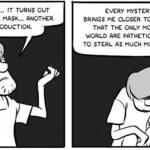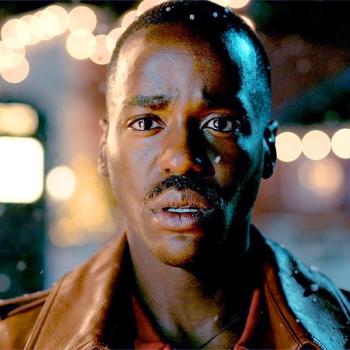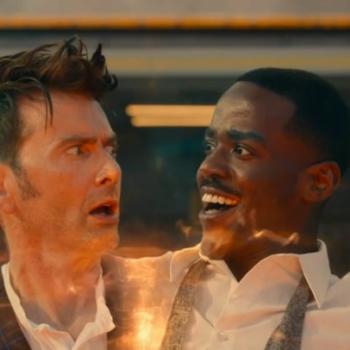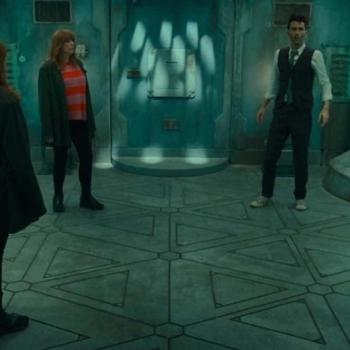The episode of Doctor Who, “Rosa,” in which the Doctor and companions meet Rosa Parks in Montgomery Alabama in 1955, certainly highlights the appalling character of American history and culture, none of which is entirely free from the taint of racism. It is interesting not least because Doctor Who has for the most part shied away from this common time travel trope focused on one person in one moment whose experience needs to unfold as the history books foretold. To be sure, the Doctor was involved in famous fires in both Rome and London. But rarely is the focus on one famous person at one decisive moment. That makes the episode particularly interesting in relation to that broader question about whether, as the Doctor claims in this episode, “History’s very delicate,” and if so, what the implications are for the important moments we find ourselves in, the real significance of which will always be clearer from the perspective of hindsight.
WARNING: Spoilers about U.S. history in the 20th century follow…
The first scene shows Rosa Parks being kicked off a bus after a confrontation with the driver. Only then does the action fast forward to 12 years later, the year 1955, when Parks would do something similar, which would have a much greater effect. The Doctor, struggling to get the TARDIS to take her companions home, finds they are in Montgomery, Alabama in 1955. And those who know the TARDIS will surely wonder whether she knew that the Doctor needed to be there. The Doctor detects traces of Artron energy, indicative of the presence of another time traveler, and so that needs to be investigated.
As they navigate their way around looking for the source, there is simply no rest for the group and in particular the non-white members of it, because of the attitudes of the locals. Ryan is slapped for picking up glove a white woman dropped. A reference to lynching is made as a threat. After Rosa Parks intervenes in the situation, she mentions Emmett Till.
We learn at one point in the episode that Ryan was in a class named after Rosa Parks but doesn’t remember all the details. His Nan, on the other hand, we learn had a t-shirt that said “Spirit of Rosa.” Graham mentions this, and shows his more detailed recollection of the events. I will add that there doesn’t appear to be such a shirt for sale online at present – if someone rectifies that, please send one to me. I wear a small.
The source of the Artron energy turns out to be an escapee from Stormcage prison with a vortex manipulator – in other words, someone not unlike River Song in at least those respects. Although his name is said to be Krasko, his suitcase (with high tech contents from the future, and obscured with a perception filter) has the initials G. F. B. on it. We’re clearly being invited to speculate and wonder where this might be headed. Krasko seems to simply be a racist who thinks that this moment in history was that at which things started going wrong.
There are moments that are comical, and they are needed in an episode making as direct and challenging a point as this one, and depicting events that are so crucially important and sensitive. Among the moments of lightheartedness include when we learn that the Doctor lent Elvis a mobile phone, who then gave it to Frank Sinatra, which works out well for the Doctor’s plan. The discussion of whether the Doctor could be Banksy was also enjoyable. The Doctor’s description of the TARDIS as having “huge mileage, one careless owner” in the manner one describes a used car was also cute, as was some of the other banter that felt very much like what we’d expect from the Doctor – for instance:
Doctor: “I’m not armed.”
Krasko: “Is that supposed to make me not shoot you?”
Doctor: “Ideally.”
But there was nothing in the humor that was allowed to predominate in the way it sometimes does in episodes of Doctor Who, perhaps because of a sense that this is sacred ground that the show is treading on.
I don’t use that expression lightly, and I was happy that the episode mentioned Martin Luther King and churches as part of the civil rights movement. There were also important details that were more subtle and thus worth highlighting: the fact that the black community gathered in homes, tired from work and daily stress and yet using still more of their waking hours to work for change, while white bus drivers had the leisure of shooting pool or going fishing down by the creek. One doesn’t adequately appreciate the impact of racism if one misses such elements as these, the kinds of things that are denoted by the term “white privilege.”
The writers seem to almost break the fourth wall when the Doctor seems to forget that she has seen America’s distant future, but mentions that 50 years after the events they are now entangled in, America will have a black president, and “who knows where they’ll be 50 years after that. That’s positive change.” The Doctor’s character would know, wouldn’t she? But even if it fits awkwardly on the lips of a time lord within the narrative, the point needed to be uttered.
It was good that Ryan and Yaz talk about how racism impacts them. Britain may be doing many things better than the United States is at present, over all, but the episode should not be understood as those without sin casting the first stone. The episode rather brings ongoing challenges for non-whites in British life – greater frequency of stops by police, name calling, and stereotyping among them – into focus. These are issues on both sides of the pond.
Another great phrase was when the Doctor told Krasko, “You’re living in the past.” Literally and metaphorically true at the same time.
The Doctor says she doesn’t want to disrupt a tipping point in history, and that “tiny actions change the world.” That called to mind the thought shared on Reddit some years ago:
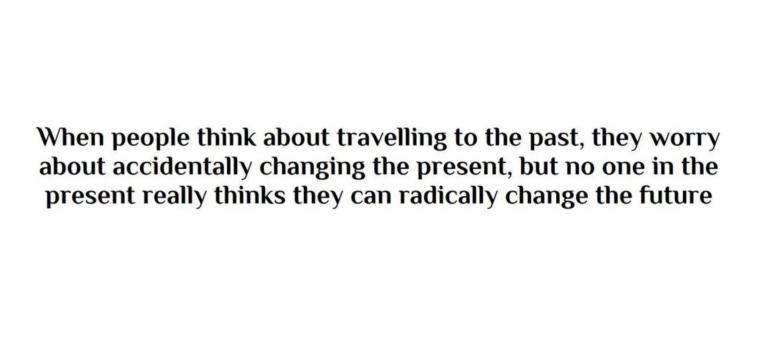
The episode raises the question of how much of the burden of changing the future (the past from the perspective of others in a universe in which time travel is possible) lies on the shoulders of one individual in one moment. Surely if Rosa Parks had not had the opportunity to make her impact on this specific day, she most likely would have done so on another one in the near future. And if she had been taken out of the picture entirely by a malicious time traveler, someone else would have acted – if not in precisely this way, then in some other. Whether that trajectory would ultimately be judged better, worse, or much the same is not something anyone without a God’s eye view of the entirety of history could ever say. And so surely an important point to make about stories like this one is that there is a risk both in downplaying the potential impact of any one individual, and overemphasizing the importance of any one individual, as though any of us ought not to step forward and take the mantle of standing against injustice upon ourselves to do what needs to be done, as though it is the exclusive destiny of someone else to do it.
Let me quote at this point from a post at IO9 about the episode: “something as systemic an issue as racism can’t be solved with trip in the TARDIS or a wave of the sonic screwdriver—it’s something has to always be resisted, over and over. The fact that Doctor Who got to tackle a theme in so stark a manner, unsubtle or otherwise, is a powerful statement about the remit and message the show still has, all these years since it first began.”
The episode ends with one of those troubling time travel moments. The Doctor’s human companions from the future realize that they were there on that day, that they are part of the story and the history. Graham understandably says, “I don’t want to be part of it.” Occupying seats on the bus as whites, they contribute to the occurrence, as the bus driver stops, the police are called, and Rosa Parks is taken off. The Doctor then tells the story of what happened next, including getting a medal from the president in June 1999. The Doctor says, “She changed the world. In fact, she changed the universe.” The reference is to an asteroid named after her, Rosa Parks. But I suspect I am not alone in having felt disappointed by that being what was referred to. Surely changing the universe has to mean that the future of humanity was more egalitarian, more just, less like Alabama in the middle of the 20th century, and not that commemorative markers are placed either in Earth or in space. Because as Ryan illustrates, we can forget the precise details and even the significance of those whose names are placed on plaques and buildings. The key thing is to have an impact on the trajectory of history that makes a difference even for those who may not even know or remember the role you played in creating the society they live in.
Finally, the episode raises the question of the role of bystanders in the sight of injustice – whether time travelers or not. The Doctor regularly seeks to do what is right, and yet also speaks of the need to refrain from meddling – or at least meddling too much – in history. Two questions immediately present themselves. One is whether that stance is, ethically speaking, genuinely different from that of the white policeman who says “that’s just the way things are.” Surely either we are allowed to and indeed ought to change the world that is our present, or we should all be fatalists. Doctor Who – like most human beings, if we are honest – seems to go back and forth inconsistently between the two. The other question is whether a situation could arise in which all the people on the bus are time traveling tourists like those in the story “Let’s Go To Golgotha.” What if all the people who watch the injustice and mumble “that’s just the way it is” are time travelers who’ve been instructed that they can go and watch history as participants on the sidelines, but are the ones who actually make it happen in the end? Such scenarios are a good reason to think that time travel isn’t actually possible – in which case, there is no good reason not to act in ways that we hope may genuinely shape the direction of the future of our community, our nation, our world, and our species.
What did you think of Rosa?


